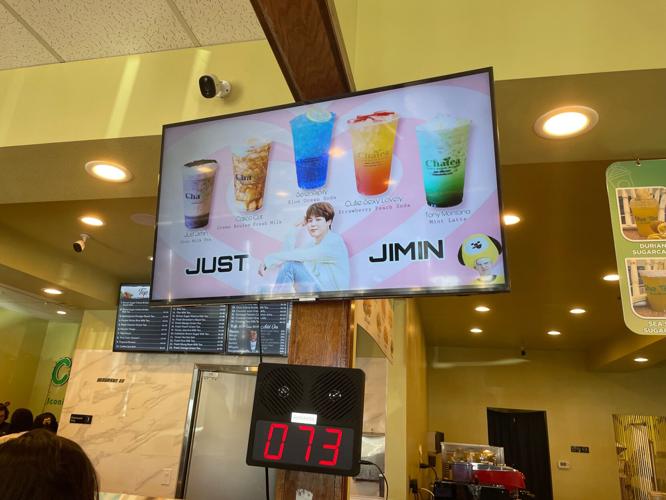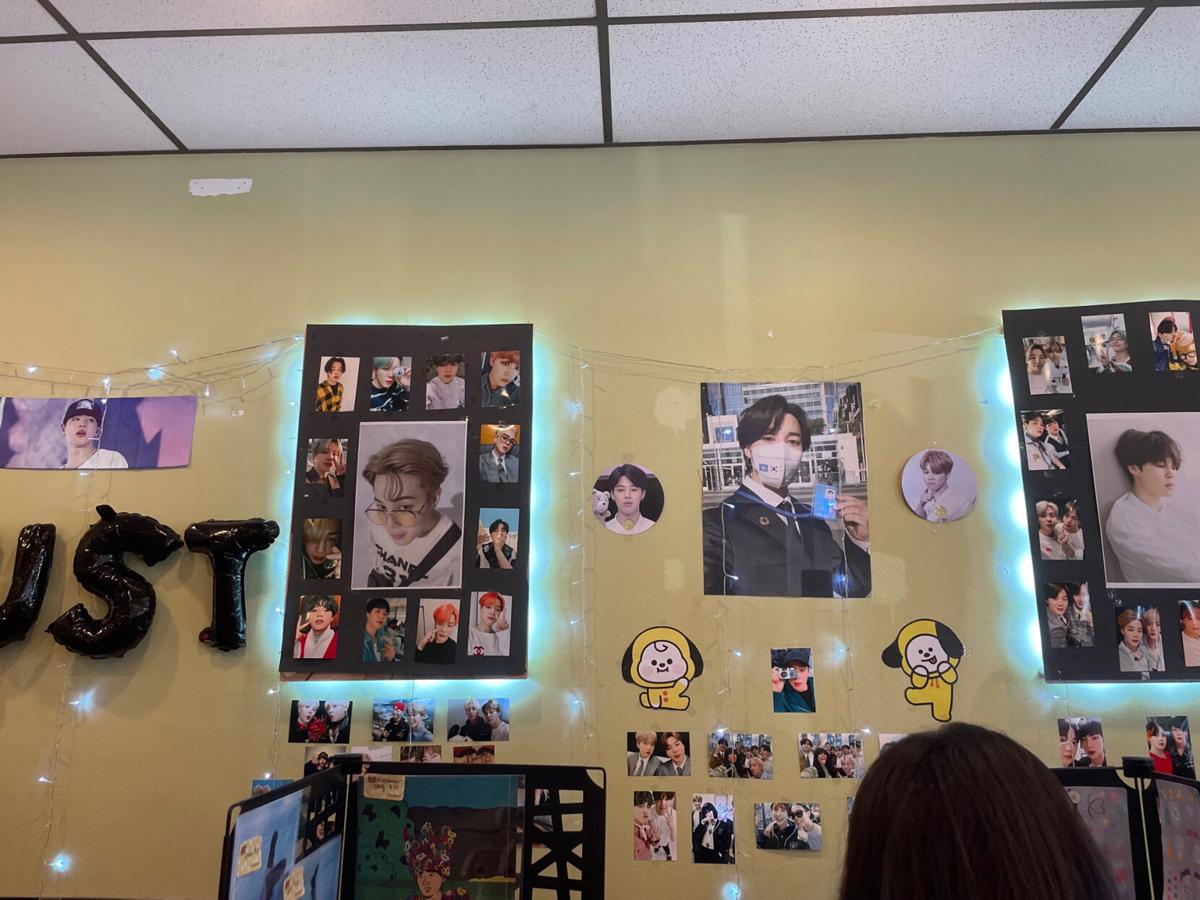MESA – Cynthia Vanhkham and Ally Fernandez sit at a small corner table in a boba tea shop, handing out tiny pictures and decorated cup sleeves to an eager crowd. Cha Tea usually is quiet; drowsy, even. But on this Saturday afternoon, it’s filled to the brim.
Hundreds of people – from high school students to middle-aged mothers – had gathered to celebrate the coming birthday of Jimin, one of the boys of the powerhouse K-pop group BTS.
Cha Tea, tucked in a strip mall on West Main Street, is ready to party. Pictures of Jimin are plastered across nearly every square inch of its walls. Small tables pack the tight space, each hosting a small business selling coffee mugs, tote bags, T-shirts, jewelry and other merchandise adorned with the faces, phrases and symbols of Jimin and other Korean-pop idols.
BTS songs blared from speakers, mixing in with the robotic voice that continuously called out drink orders that were ready for pick-up. Cha Tea is selling special drinks created to celebrate Jimin’s 26th birthday, called “Serendipity” and “Tony Montana” – two of BTS’s hit songs – and “Cutie Sexy Lovely,” Jimin’s self-bestowed nickname.
The music, drinks and trinkets all are part of a strategy to connect with ARMY, the name of BTS’s millions-strong fanbase. And the strategy seems to be working. A long, snaking line of fans outside Cha Tea could be seen from practically anywhere in the strip mall.

Special drinks created by Cha Tea to celebrate Jimin’s birthday were called “Serendipity” and “Tony Montana” — two of BTS’s hit songs — and “Cutie Sexy Lovely,” Jimin’s self-bestowed nickname.
Popular music has long been a revenue generator for businesses, particularly since the 1950s, when rock 'n' roll and a focus on young listeners converged. Merch from the Beatles, Spice Girls and Britney Spears filled the shelves of retail stores around the world at the peaks of their popularity, bringing in customers and driving sales.
K-pop gives businesses another opportunity to capitalize on a genre’s popularity. One big difference is that these are Asian artists, often singing in their native languages, who appeal to a mostly English-speaking audience in the United States.
As a genre, K-pop has been around since the 1990s in South Korea, with brief flashes of exposure in the U.S. Still, no K-pop group found lasting success in the U.S. market until BTS released their breakthrough album, “The Most Beautiful Moment in Life,” in 2015.
Many businesses, small and big, have sought to cash in on it.
In May 2021, McDonald’s sold 1.2 million BTS-inspired chicken nugget meals, resulting in an increase of 40.5% in sales over the same period the previous year, according to the fast food giant.
Small businesses also have used the band’s popularity to their advantage, but none more than boba tea shops, a popular hangout for young people in the U.S. Many shops partner with fan groups to host cup-sleeve events, which started in South Korea to celebrate special dates for a K-pop idol or group. The fan group takes care of decorations, the sleeves and inviting people and vendors.
“Finding a location usually isn’t that hard because the shops are usually pretty accepting of it because we bring in customers,” said Vanhkham, one of two members of AZyouniverse, the fan group that organized the event at Cha Tea in October.
“When customers come in and they buy a drink at the shop, they get a cup sleeve and usually some other freebies like photo cards or keychains.”

Decorated cup sleeves adorned Jimin-inspired drinks at Cha Tea in October.
AZyouniverse began in 2019 as a way for Vanhkham and Fernandez, 23-year-old friends and BTS fans, to connect ARMYs in Arizona. They held the first event at a roller-skating rink in Glendale.
“I think, like, 80 people showed up to that,” Fernandez said. “We were, like, ‘Oh my God, this is kind of cool.’”
Since then, Vanhkham, a nurse, and Fernandez, an architecture graduate student, have organized six events at boba shops in the Phoenix and Tucson areas.
Wendy Pham, a barista at Cha Tea, said cup sleeve event days are hectic and five times busier than a normal weekend day.
“But we completely forget about how overwhelming the entire event day was as we were able to help the business grow,” Pham said.
Brian Chong has built a successful business on the phenomenon of K-pop while honoring his Korean roots. He immigrated to the United States in 1976, determined to start a business to share his culture. It took him 12 years to open a traditional Korean barbecue restaurant in the Koreatown section of Carrollton, Texas.
The problem was, few non-Koreans were coming in to explore Korean cuisine.
But in 2008, Chong added elements of K-pop into his restaurant to make the experience more than just about eating bulgogi. This was long before most Americans had even heard of K-pop.
“I started showing K-pop videos on the screens because we had like 15 TVs and screens,” Chong recalled. “I wanted to show non-Koreans what K-pop and Korean culture are, and they seemed to really enjoy our culture.”
His idea took off, bringing many new diners to his restaurant. Soon, Chong was opening boba tea shops in and outside Texas. The most recent, Dragon Boba in Los Angeles, opened in January 2020.
The shop’s Instagram page is a plethora of K-pop: patrons posing with lifesize cardboard cutouts of the BTS boys, macaron pastries decorated to look like BTS-related characters, and rainbows of drinks adorned with colorful BTS cup sleeves.
Michelle Ochoa of Flower Vantae, a fan group that organizes many events at Dragon Boba, said a typical event brings in about 5,000 fans.







